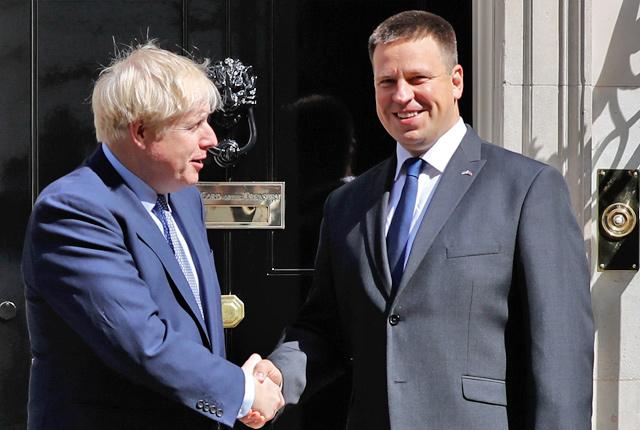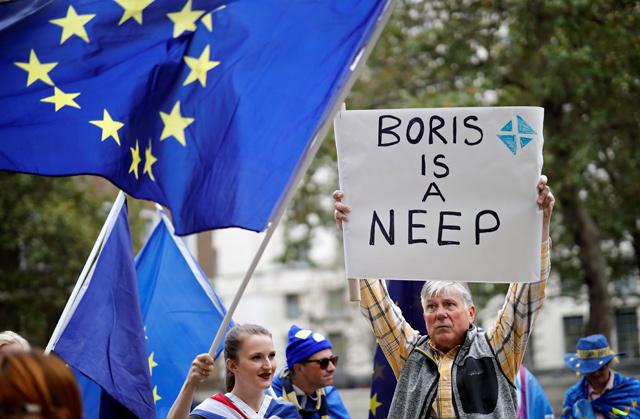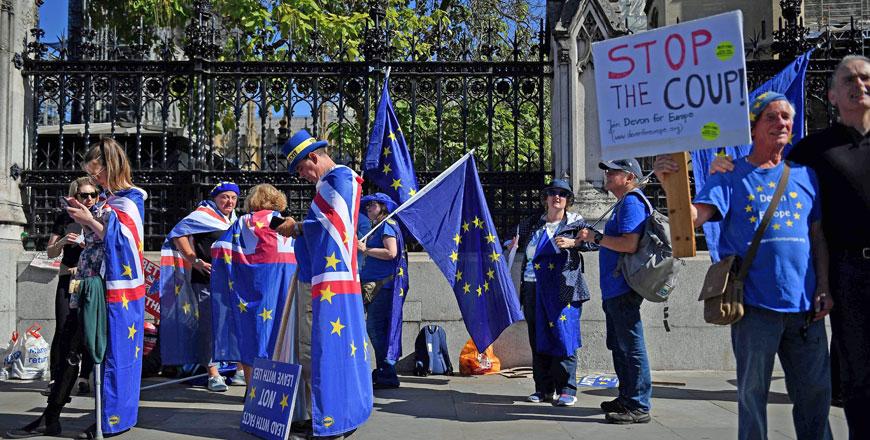You are here
‘Surrender’?: The law aimed at blocking no-deal Brexit
By AFP - Sep 09,2019 - Last updated at Sep 09,2019

Anti-Brexit protesters stand outside the Houses of Parliament in London on Monday (AFP photo)
LONDON — British Prime Minister Boris Johnson says the law will bind his hands while he tries to get a new Brexit deal in Brussels while his opponents say it is a vital precaution to avert economic disaster.
The Brexit law that received royal assent on Monday is at the centre of a constitutional stand-off with enormous implications for Britain.
Ultimately the decision of whether or not to delay Britain's EU departure if no divorce deal has been agreed is one that must be taken by all 28 European Union leaders unanimously.
But the law would place important limitations on what a British prime minister can and cannot do even though Foreign Secretary Dominic Raab has said the government has said it will "test to the limit" the law in court.
Here are the main points in the proposed legislation which Johnson calls a "surrender" document:
October 19 deadline
The bill states that if by October 19 the government has not reached a separation deal with the EU, the prime minister must ask to delay Brexit until January 31, 2020.
The deadline is set after an EU summit on October 17-18 and before the current scheduled Brexit date of October 31.
The only exception to the delay is if MPs vote in favour of a no-deal Brexit before October 19 — an unlikely prospect.
"The purpose of the bill is to ensure that the UK does not leave the European Union on the 31st of October without an agreement, unless parliament consents," said Hilary Benn, the Labour MP who presented the legislation.
Johnson has stated that he will not accept any delay and says the law will undermine the government's negotiating position with Brussels and force it to accept their terms.
The legislation includes a copy of the letter that the prime minister would have to write to EU Council president Donald Tusk to formally request a delay to Brexit.
"The United Kingdom is seeking a further extension," the letter states, adding that the Brexit date could be brought forward if a deal is ratified before January 31.
Under the law, the prime minister would have to immediately accept an offer from EU leaders to delay Brexit until January 31.
If the extension offered by the EU is to a different date, the prime minister would have two days in which to accept.
The only way of not accepting a delay in that case would be if parliament votes against it within those two days.
If a delay is agreed, then the government must publish a report by November 30 "explaining what progress has been made in negotiations on the United Kingdom's relationship with the European Union".
The government would then have to make another report by January 10, 2020 on setting out its Brexit plans.
If there is still no deal by January 31, the law implies that Brexit would have to be delayed again.
It forces the government to report at least every 28 calendar days from February 7, 2020 until an agreement with the European Union is reached or until otherwise indicated by a resolution in the House of Commons.
Johnson has warned that the legislation could have the effect of delaying Brexit "potentially for years".
The exception, again, would be a parliamentary vote in favour of a no-deal Brexit.
Related Articles
LONDON — Will he, will not he — and can he be stopped?
LONDON — British Prime Minister Boris Johnson insisted on Tuesday he was working hard to strike a divorce deal with the EU, after he suspend
LONDON — Prime Minister Boris Johnson said Thursday Britain will be ready for a no-deal Brexit on October 31 despite his own government's as














